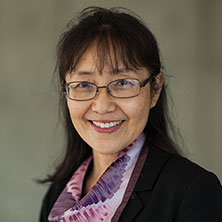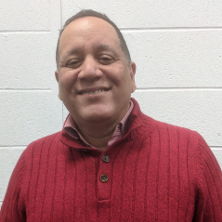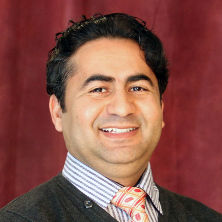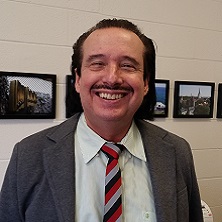Languages for Professional Success
One third of New Jersey residents speak a language other than English at home. After Spanish, the top four languages spoken at home are Tagalog, Chinese, Hindi, and Korean. New Jersey is also home to significant populations of Arabic, Portuguese, and Creole speakers. Centered around the concept: “From Local to Global: Languages for Professional Success and the Common Good," Seton Hall’s new language courses focus on two tracks of study: Healthcare and Diplomacy and International Relations.
The programs seek to meet the professional needs of Seton Hall's students and of the local and global communities that the university serves. The new curriculum comprises language training and certification programs with a strong experiential component in both healthcare and diplomacy. A primary feature of the courses will be the opportunity to participate in experiential learning through simulations, internships, or other relevant placements. Instruction is provided in collaboration with the College of Nursing, the School of Health and Medical Sciences, the School of Diplomacy and International Relations, and other partner units across campus.
Languages for Healthcare
A comprehensive certificate program for the Seton Hall student population as well as working practitioners.
 The Languages for Healthcare program provides allied health majors (Nursing, pre-SHMS, SHMS, pre-Med) and practicing professionals
with the linguistic training, medical terminology, and cultural background needed
to effectively communicate with the diverse populations they might encounter in their
professional lives.
The Languages for Healthcare program provides allied health majors (Nursing, pre-SHMS, SHMS, pre-Med) and practicing professionals
with the linguistic training, medical terminology, and cultural background needed
to effectively communicate with the diverse populations they might encounter in their
professional lives.
Comprised of Beginner 1 & 2, Intermediate 1 & 2, or Advanced 1 & 2 level courses (depending on the language), the curriculum provides students with professional linguistic skills and technical medical vocabulary in the target language as well as lessons in cultural awareness and sensitivity. Students are provided the opportunity to use the target language in clinical and other settings. By the end of the program, the student’s oral proficiency level should be sufficient to sustain conversations in the target language in medical environments/settings.
Completion of each course might fulfill one semester of the language requirement, depending on the major’s or college’s required level of completion for languages. See course descriptions below for how each course corresponds to the standard language levels.
Click the desired language below for descriptions of the courses offered:
Esther Williamson, D.P.T. candidate, discusses the benefits of other languages for healthcare providers. In English and Spanish.
For More Information, Contact:
Elizabeth McDermott, Assistant Dean, College of Nursing
Natalie Neubauer, Assistant Dean for Undergraduate and Clinical Education, School of Health and Medical
Sciences
Jerry Monaco, Program Director of Interprofessional Health Sciences, School of Health and Medical
Sciences
Peter Shoemaker, Professor of French, Department of Languages, Literatures and Cultures
Chinese
CHIN 1104 Introductory Chinese for Healthcare Providers 1 | This course is the first part of Introductory Chinese for Healthcare Providers, designed for NS and IHS students who are training to be future healthcare leaders. Basic Pinyin Romanization, pronunciation, vocabulary, and grammar are covered, along with a set of healthcare-related terms. In addition, Chinese cultural aspects relevant to healthcare contexts are incorporated. Students are cultivated to develop speaking, listening, reading, and writing skills in modern Mandarin Chinese, with an emphasis on listening comprehension and the ability to communicate orally in basic everyday situations. This course level is the equivalent of CHIN 1102 Introductory Chinese 1; students with no background in Chinese who have a professional interest in using the language in healthcare settings can take this course in place of Introductory Chinese 1.
CHIN 1105 Introductory Chinese for Healthcare Providers 2 | This course is the second part of Introductory Chinese for Healthcare Providers, designed for NS and HIS students who have completed CHIN 1104 or 1102, or those who have a good mastery of Pinyin Romanization, pronunciation, and grammar. This course will continue to help students develop listening, speaking, reading, and writing skills in Chinese in order to communicate effectively in everyday situations as well as in healthcare contexts. Words related to healthcare will be introduced with more complex sentence structures. Throughout the course, Chinese cultural and cross-cultural knowledge and skills will be emphasized to further cultivate future healthcare leaders’ understanding of cultural practices, products, and perspectives related to topics in the healthcare environment. This course level is the equivalent of CHIN 1103 Introductory Chinese 2. Prerequisite: CHIN 1102 or 1104 or placement into CHIN 1103 per the Language Placement Test.
Japanese
Introduction to Japanese for Healthcare Professionals 1 (JAPN 1215) | This Fall semester course is designed to facilitate effective communication between Japanese speaking patients and English-speaking healthcare professionals who have not previously studied the Japanese language. The course offers a complete elementary language course for classroom study that teaches Japanese grammar along with the Japanese medical vocabulary. The course covers every step of a patient's interaction with healthcare providers, from appointments and admissions to the physical examination, symptoms and illnesses, diagnosis, treatment, instructions to the patient, discharge, and follow-up. Each lesson includes basic Japanese vocabulary, a situational dialogue, Japanese grammar points and key Japanese language and culture notes, exercises and practice drills, and a quiz to sharpen comprehension. The culture and language notes seek to help the provider better understand a Japanese patient’s cultural framework and patterns of belief, as well as the “un-translatable” meaning conveyed by certain idioms. This course level is the equivalent of JAPN 1102, Introduction to Japanese 1.
Introduction to Japanese for Healthcare Professionals 2 (JAPN 1216) | This Spring semester course is a continuation of JAPN 1216. The course covers the major branches of medicine as well as dentistry and the corresponding bodily systems. There are also lessons on anatomy, infection and disease, and visits to the pharmacy. Each lesson follows a natural progression designed to help the Japanese learner comprehend the new material and acquire the language as effortlessly as possible, emphasizing the learner's practical use of the Japanese language for healthcare settings and the importance of culture in understanding. This course level is the equivalent of JAPN 1103, Introduction to Japanese 2. Prerequisite: JAPN 1215 or 1102 or placement into JAPN 1103 per the Language Placement Test.
Spanish
Spanish for Healthcare Providers 1 (SPAN 2005) | This course corresponds to Intermediate Spanish 1 (SPAN 2001). It teaches the same
language-learning topics as 2001 while incorporating Spanish medical terminology and
cultural lessons relevant to the target population. Students at this proficiency level
who have a professional interest in using Spanish in healthcare settings can take
this course in place of Intermediate 1. Prerequisite: SPAN 1002 or placement into SPAN 2001 per the Language Placement Test.
Spanish for Healthcare Providers 2 (SPAN 2006) | This course corresponds to Intermediate Spanish 2 (SPAN 2002). This continuing course
from 2005 teaches the same language-learning topics as 2002 while incorporating Spanish
medical terminology and cultural lessons relevant to the target population. Students
at this proficiency level who have a professional interest in using Spanish in healthcare
settings can take this course in place of Intermediate 2. Students do not need to
take 2005 to be able to enroll in this course. Prerequisite: SPAN 2001 or SPAN 2005 or placement into SPAN 2002 per the Language Placement Test.
Advanced Spanish for Healthcare Providers 1 (SPAN 3015X) | This course corresponds to Advanced Spanish 1 (SPAN 3001). It teaches the same language-learning
topics as 3001 while incorporating Spanish medical terminology and cultural lessons
relevant to the target population. Students at this proficiency level who have a professional
interest in using Spanish in healthcare settings can take this course in place of
Advanced 1. Students do not need to take 2006 to be able to enroll in this course. Prerequisite: SPAN 2002 or 2006 or placement into SPAN 3001 per the Language Placement Test.
Advanced Spanish for Healthcare Providers 2 (SPAN 3016X) | This course corresponds to Advanced Spanish 2 (SPAN 3002). It teaches the same language-learning topics as 3002 while incorporating Spanish medical terminology and cultural lessons relevant to the target population. Students at this proficiency level who have a professional interest in using Spanish in healthcare settings can take this course in place of Advanced 2. Students do not need to take 3015 to be able to enroll in this course. Prerequisite: SPAN 3001 or 3015X or placement into SPAN 3002 per the Language Placement Test.
Tagalog
Introductory Filipino for Healthcare Providers I (FILI 1101) | This course introduces the four basic skills of language acquisition—listening, speaking,
reading and writing—with emphasis on speaking and comprehending spoken Filipino. The
course also introduces the Filipino language and the culture of the Filipino-speaking
world. It is the first of two semesters, followed by Introductory Filipino for Healthcare
Providers II. Students will be learning to speak Filipino in the context of their
current or future work as healthcare professionals. This course is designed for students
with little or no background in Filipino. It is a skills-development course that will
require students to learn, practice, and apply knowledge and abilities in a consistent
and dedicated manner.
Languages for Diplomacy and International Relations Practitioners

A comprehensive certificate program for the Seton Hall student population.
Suitable for all students—including Diplomacy, International Relations, and Political Science majors—these courses provide rigorous certification programs for anyone interested in international service, diplomacy, and foreign service. The co-curriculum connects students with experience in different languages by providing enrichment opportunities, primarily in the form of internships, offered through the School of Diplomacy and International Relations. The courses will teach key vocabulary and communication skills along with cultural context. At the completion of the program, students should be positioned to successfully achieve a certification of linguistic proficiency. The courses count toward the School of Diplomacy and International Relations’ language requirements.
In addition to the individual courses listed below, students are also able to pursue a Diplomacy Language Certificate in French, Arabic, Japanese, or Spanish. Click the link at the end of the course description boxes below for more information on the requirements for earning a Diplomacy Language Certificate in your chosen language.
Click the desired language below for descriptions of the courses offered:
For More Information, Contact:
Martin Edwards, Associate Dean, School of Diplomacy and International Relations.
Peter Shoemaker, Professor of French, Department of Languages, Literatures and Cultures
Arabic
Professional Arabic: Media and Diplomacy 1 (ARAB 4101) | Offers students the tools and the hands-on experience required to access, translate, interpret news information both written and visual related to the current affairs in the Middle East and North Africa. The course introduces students to the evolution of Arabic media in the last two centuries, as well as to specialized vocabulary, concepts, style and content of the Arabic press and broadcast media, and to the modern diplomatic lexicon used in the Arabic official documents. The course is taught in Arabic and English and is technologically enhanced using media related applications. It is conducted according to the communicative, student-centered, and collaborative (group-work) approach of instruction.
Professional Arabic: Media and Diplomacy 2 (ARAB 4102) | In the second part of Professional Arabic for Diplomacy and Media, students will deepen their competences in translation, reporting, and the use of digital tools for Diplomacy. Students will participate in field work through organized visits to the UN in New York and close work with Middle East Diplomatic missions based in the US or the Middle East. The practicum component includes interviews and workshops with officials from several embassies and foreign ministries in exactly the mode of Arabic language (formal and dialect) they will need for their roles as diplomats. The customized curricula, taught in both Arabic and English, includes relevant topics that most concern those involved in diplomacy in the region, especially the role of US policy and the quality of Diplomatic ties between the US and countries in the Middle East and North Africa.
French
The Values of the French Republic (FREN 4821) | The first in a two-course sequence focusing on constitutional issues, national identity, and international relations of the French Republic. This course explores the history of French republican values with an emphasis on the ways in which essential concepts, such as “citoyen,” “liberté,” and “égalité,” are understood in French legal and political parlance in order to better grasp how they continue to shape life in a multicultural and multiracial population. Current debates around French national identity will be discussed with special emphasis placed on laïcité (a cousin to the American concept of separation of church and state but which establishes a stricter barrier between the two). Course is taught entirely in French. Prerequisite: FREN 3002. Please note: In order to obtain a certificate, students need to take both 4821 and 4822.
French Diplomacy and Foreign Policy (FREN 4822) | Having studied in the first course the evolution of how basic republican concepts have shaped French society especially among its immigrant populations, in this second course, we will explore the theory and practice of diplomacy as viewed through a French lens as well as historical and contemporary examples of French foreign policy and diplomatic engagement with 1) the United States (and NATO), 2) Europe (the EU but also Russia), and 3) Africa (with a focus on North Africa). Emphasis will be placed on how French republican values translate into specific kinds of engagement with an eye toward acquiring and perfecting the use of vocabulary specific to Diplomacy and International Relations. Prerequisite: FREN 3002. Please note: In order to obtain a certificate, students need to take both 4821 and 4822.
Japanese
Japanese for Diplomacy and International Relations I (JAPN 3215) | Japan has the third largest GDP in the world. It is also the third largest contributor to the United Nations after the United States and China. Learning about Japan's diplomacy and international relations will be meaningful for imminent diplomats. This course is a specialized Japanese language content-based instruction (CBI) that covers diplomacy and international relations related vocabulary, grammar, political history, etc. for developing language skills that can play a dynamic role in international organizations. The language proficiency goal for this course is to acquire ACTFL Intermediate High Level and to obtain the competence to endure in the 21st century skills by integrating Critical Thinking and Cooperative Learning. Prerequisite: JAPN 2102 or instructor’s approval.
Japanese for Diplomacy and International Relations II (JAPN 3216) | This course is a continuation of JAPN 3215 Japanese for Diplomacy and International Relations I and provides specialized Japanese language content-based instruction (CBI) that covers vocabulary, grammar, political culture, etc. for developing language abilities that can play a dynamic role in international communities. The language proficiency goal of this course is to acquire ACTFL Advanced Low Level and the language ability to subsist in the 21st century by integrating Critical Thinking and Cooperative Leaning. This course focuses on international issues surrounding Japan as well as in international communities that prepare imminent diplomats. Prerequisite: JAPN 3215 or instructor’s approval.
Spanish
Spanish for Business and Diplomacy I (SPAN 3024) | A study of the Spanish language in its application to business, international service and diplomacy. It is designed to provide the student with a broad foundation in the vocabulary and discourse used in Spanish when dealing with different aspects of business and diplomacy, both national and international. This course is conducted mainly in Spanish with a communicative goal of further developing the four traditional language skills (speaking, listening, comprehension, reading, and writing). Prerequisite: SPAN 3002 or instructor’s approval.
Spanish for Business and Diplomacy II (SPAN 3025) | A study of the Spanish language in its application to business, international service, and diplomacy. It is a continuation of Span 3021. It is designed to provide the student with a broad foundation in the vocabulary and discourse used in Spanish when dealing with different aspects of business and cultural understanding, both national and international. This course is conducted mainly in Spanish with a communicative goal of further developing the four traditional language skills (speaking, listening, comprehension, reading, and writing). Prerequisite: SPAN 3002, SPAN 3024, or instructor’s approval.
Faculty
 |
DongDong Chen, Ph.D. Professor of Asian Studies Department of Languages Literatures and Cultures |
 |
Matthew Escobar, Ph.D. Associate Professor of French and Spanish, Prestigious Fellowships Director Department of Languages Literatures and Cultures |
 |
Shigeru Osuka, Ed.D. Professor of Asian Studies and Japanese Department of Languages Literatures and Cultures |
 |
José Manuel Prieto, Ph.D. Associate Professor of Spanish Department of Languages Literatures and Cultures |
 |
Peter Shoemaker, Ph.D. Professor of French Department of Languages Literatures and Cultures |
 |
Youssef Yacoubi, Ph.D. Assistant Professor of Arabic, Co-director of Middle Eastern and North African Studies Department of Languages Literatures and Cultures |
 |
Daniel Zalacaín, Ph.D. Professor of Spanish Department of Languages Literatures and Cultures |

